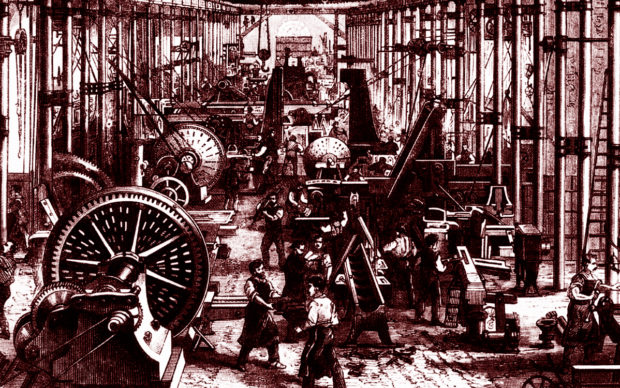Thank you, Professor Fraser, for being here, and for such a stimulating paper. What I appreciated most was its refusal of a trend (or a temptation) in which conversations about necessary relationships between social phenomena – like capital and race; one could add gender – treat those phenomena as abstract ideal types without histories, whose logics can be neatly mapped for all time. We might worry today that Immanuel Wallerstein’s opposition between “logical” and “historical” conceptions of capitalism has been harmful beyond his intentions; witness those contemporary “new historians of capitalism” who explicitly reject any attempt to define capitalism, which they see as an anti-historical demand. Your paper demonstrates the possibility of thinking about capitalism’s logic and its history together, using each conversation to inform and improve the other. The paper’s chief political virtue is to conceive emancipatory politics as necessarily anti-capitalist and anti-racist, in keeping with long traditions of black Marxism and beyond. Its chief intellectual virtue is its desire (which again has a noble history) to ground that conception in a holistic portrait of structures of domination, which treats their agents as limited at once by the compulsions of identifiable logics and by the contingencies of history. Sharing its political project, I want to raise some questions about its method of grounding the project.
The paper’s headline claim is that while capitalism has always relied on both exploitation and expropriation – the legal tip of the capitalist iceberg and its dark underside, in an old image from Maria Mies – a seismic shift has occurred in the relationship between these two “exes”. Where once capital produced two different kinds of dominated subject, the exploited and the expropriated, today that split is hazier and those forms of domination are meshed in the production of financialized capitalism’s simultaneously exploited and expropriated precariat. Given that expropriation is treated here as the chief locus of racialisation, and given that expropriation is necessary to capitalism throughout this story, the answer to the question, “is capitalism necessarily racist?” is “yes.” That may seem a predictable answer for the Left today, and it is not where the meat of this paper lies – though it is worth remembering how recently some Marxists as well as the free-market Right saw racism as a hindrance rather than a handmaiden to capitalist development. But the answer also involves elaborating two different kinds of necessity at different stages of capitalist development: one that appears external to the wage-relation but is necessary to its reproduction (as in Rosa Luxemburg, for example), and then a newer form that structures the wage-relation itself.
I have plenty of questions about this argument. I want to run very briefly through just four of them in the hope of flagging some significant areas for further discussion. I hope these are all generative uncertainties as an exciting and longstanding intellectual project continues with this paper’s turn to a simultaneously historical and logical narration of racism as a feature of bourgeois society.
First, why is race located only in expropriation and not also in exploitation? This view has a long history; though it is often traced to the early twentieth century, in fact it was frequently Marx’s view – present as early as 1846 in a letter to Pavel Annenkov, in which Marx posits that industrial production by doubly free proletarians depends on value extracted by expropriation from slaves. Racism has its basis outside the wage-relation then, maintaining the integrity of what some Marxists have called “the separation of the economic from the political”. Isn’t this to buy into bourgeois ideology? The risk is that “exploitation” gets treated along the model of that other “ex”, not violent “expropriation” but anonymous market “exchange.” The assumption is that if capital renders labour fully “abstract”, fully a “fictitious commodity,” then social hierarchies between concrete workers have little place in the exchange of labour-power for wages. An alternative view stresses how exploitation is structured by ascriptive social hierarchies that push down wages for some and so discipline the labour market in myriad ways, not least by coding subjects to enable their conscription to particular forms of wage labour. Racialisation is therefore a mechanism of exploitation, and treating it as something outside exploitation risks letting apologetic presentations of an abstract marketplace (as an egalitarian space) intrude by the back door. The point that capitalism relies on expropriation which is thoroughly and viciously racialised is well made, but that need not be the only place where race does crucial work for capital.
Secondly, where is ideology in this account of racism? The paper touches on this in thinking about the persistence of racism today, but I worry about models of racism that generalise too far from the African-American or Native American experiences: slavery and land theft as the geneses of racial demarcations. What would change if we started instead from Islamophobia or anti-Semitism? Those seem today to interact with capitalism at a level that is less foundational (immediately enabling commodity production) and more political: Islamophobia sustains imperialism and anti-Semitism is a fetishistic discourse of ostensible anti-elitism. Both of those readings should hint at how Islamophobia and anti-Semitism are connected to capitalism, but in slightly different ways than a focus on settler-colonialism and primitive accumulation as the generative moments for (all) racism might suggest. I think a general lesson obtains here: “racism” is not only the material phenomenon of racialised inequalities, it is of course the ideological device that links inequalities to the perceived cultural or biological properties of subjects. Accounting for the relationship between capitalism and racism ought therefore to demand an explanatory theory of the forms of thinking generated by a world of capitalist production – the old task of ideology critique. This is not to pit intellectual explanation against the focus on those material experiences of humiliation and arbitrary power that characterise expropriation; it is rather to say that the intellectual and the material are co-constitutive, that modes of domination generate modes of thought that then aid in the perpetuation of domination, such that ideology as well as expropriation are categories that help make sense of the relationship between capitalism and racism.
Third, why put accumulation in the driver’s seat? I sense here, as elsewhere in Fraser’s work, a picture of social totality in which M-C-M’ drives both exploitation and expropriation: accumulation is the essence behind all the messy appearances of bourgeois society – an essence/appearance division that characterises broadly Hegelian approaches to the social world. In discussions of gender, Marxist feminists tend to speak of “sexism under conditions of capitalism” and radical feminists tend to speak of “capitalist production under patriarchy”; in both cases a single determining, dominating essence sits atop the whole social structure. Might the truth be something more like Althusser’s model of “complex totality”, in which racism can have its own autonomous history that then meets and interacts with commodity production and circulation, indeed is overdetermined by it? I think that might be a way of guarding against dangers of functionalism, and I think it speaks more persuasively to the real historical experience without jettisoning the hunt for totality. To clarify: this does not require that race predates capitalism (as is clearly true of gender; the case of race is at least more disputable on that front) but only that its history has involved immediate dictation by principles other than just capitalist accumulation, so that the welcome task of assembling a picture of the capitalist totality capable of integrating race may be a more difficult task than is suggested by the broadly Hegelian (we might say Lukácsian, for making the commodity form and the law of value something like the Hegelian Substance) model of totality. One way of bringing together all of these points would be to say that ideology, politics and – I would add here – the state are important levels of the capitalist totality that require thinking about, where a neater model of “simple totality” in which race is more immediately reduced to the value-form fails to incorporate central aspects of the work of racialisation.
My fourth question is about “financialised capitalism”. Is the meshing of exploitation and expropriation the best way to narrate our epoch? Do these cease to be two sharply differentiated spheres, as this paper suggests? I raise this for discussion first because critical histories of neoliberalism frequently stress its aggressive expansion of expropriation as a field distinct from exploitation in the manner assigned in this paper to an earlier period of capitalism: in Sandro Mezzadra’s focus on “extraction”, for example, or David Harvey’s insistence on treating some spatial fixes as evidence that primitive accumulation is not limited historically to the birth of capitalism. Secondly, I raise the point because I am not sure why expropriation should be our analytical term through which to understand changes in the treatment of wage-labour under conditions of neoliberalism. I don’t immediately see why the five-fold imbrication of falling market and social wages, rising private and sovereign debt, the privatisation of social reproduction, the racialised acceleration of the carceral disciplining of the labour force and the reassertion of spatial hierarchies against postcolonial radicalisms is equivalent and reducible to “expropriation”. Exploitation and bids to secure higher rates of relative surplus-value seem to sit behind most of those developments taken individually, and to my mind the emergence of all of them together summons political answers about initially reactive attempts from the mid-1970s to quash profound and allied challenges to the existing order pitted against its interdependent hierarchies of class, gender, race and nations. This is, again, to raise the need for an account of the various levels of the capitalist totality and their interrelations: bringing the state, politics and ideology back in.
One last comment, which is slightly more speculative. I sometimes find these discussions have a historically peculiar character. In the middle of the twentieth century, asking “is capitalism necessarily racist/sexist?” was a political question through which anti-capitalists told feminists and anti-racists that they ought to be demanding the end of capitalism. It was a conversation that belonged in struggles more than in seminars. After proclamations about the “End of History” from the 1990s and the Left’s regrettable retreat from attempts to elaborate that post-capitalist horizon, the discontented have searched for other, nastier lines of antagonism. Where are we now? The last part of this paper suggests that it should be easier to connect struggles against exploitation and expropriation now that they are experienced by the same people. That seems intuitively plausible. But in the 1920s the Third International built a powerful two-pronged coalition, seeing capitalism and imperialism as co-dependent and so allying fights in the metropole and in the periphery. The paper suggests that connection should be more easily accomplished now than it was then, but is that our real historical experience? If not, then the problem might lie elsewhere – at the level of political vision, perhaps. I mean to suggest that socialism functions now as either i) a regulative norm or ii) a reforming and in some senses conservative aspiration to restore some lost stability to capitalism and to blunt its sharp edges amid the expanding experience of precarity and higher rates of exploitation, but not as a concrete roadmap for comprehensive social transformation to overcome alienation and exploitation, founded on the identification of those contemporary contradictions whose resolution provides a path out of capitalism. We on the Left certainly see capitalist contradictions, indeed Fraser’s work on care and social reproduction is an instance of that, but the following view was more defensible in 1917 and perhaps even in 1968 than it is now: that both agents and objects for global social transformation could be clearly identified with an equally sharp sense of the steps those agents ought to take to enact a transition out of capitalism. Is it not harder now to construct that vision? If so, then the most useful formula is not “we can only abolish racism by abolishing capitalism” but rather “we can only meaningfully confront racism once we have a compelling sense of how to challenge contemporary capitalism, or at the very least how to ameliorate it (which is not the same thing)”. That is unavoidably a political question not only of strategy but of vision too. Certainly, we still have the slogans demanding coalitions of the oppressed, and it is heartening to see the rediscovery of those slogans amid some revival for the radical Left in the contemporary United States. Whether we have the ability to think more concretely about the transition to socialism is another matter, and against more extreme criticisms of utopian thinking I take it that some such intellectual confidence is a necessary precondition for the anti-capitalist coalitions and politics demanded in this paper: the availability of purportedly anti-systemic languages on the Right confirms that discontent and even a sense of the violence of capitalism are not by themselves sufficient to rally people to anti-capitalist politics. How to restore or otherwise improve the battered life-worlds of (say) West Virginia coal miners in ways that are emancipatory, rather than relying on ecological or other forms of violence? Should that be our goal? Unfortunately, this is where I think we find ourselves lost today, in the Trumpian pit that results when only the Right can generate a feasible politics of antagonism amid the experience of crisis. And so we cannot think about racism and capitalism without thinking about the crisis of anti-racism as a crisis – and in part a real intellectual crisis – of anti-capitalist politics.







No Comments